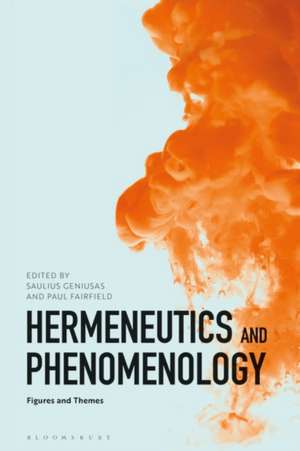Hermeneutics and Phenomenology: Figures and Themes
Editat de Saulius Geniusas, Professor Paul Fairfielden Limba Engleză Paperback – 18 mar 2020
| Toate formatele și edițiile | Preț | Express |
|---|---|---|
| Paperback (1) | 224.41 lei 6-8 săpt. | |
| Bloomsbury Publishing – 18 mar 2020 | 224.41 lei 6-8 săpt. | |
| Hardback (1) | 715.42 lei 6-8 săpt. | |
| Bloomsbury Publishing – 19 sep 2018 | 715.42 lei 6-8 săpt. |
Preț: 224.41 lei
Preț vechi: 288.70 lei
-22% Nou
Puncte Express: 337
Preț estimativ în valută:
42.95€ • 44.67$ • 35.99£
42.95€ • 44.67$ • 35.99£
Carte tipărită la comandă
Livrare economică 13-27 martie
Preluare comenzi: 021 569.72.76
Specificații
ISBN-13: 9781350155275
ISBN-10: 1350155276
Pagini: 248
Dimensiuni: 156 x 234 x 16 mm
Greutate: 0.35 kg
Editura: Bloomsbury Publishing
Colecția Bloomsbury Academic
Locul publicării:London, United Kingdom
ISBN-10: 1350155276
Pagini: 248
Dimensiuni: 156 x 234 x 16 mm
Greutate: 0.35 kg
Editura: Bloomsbury Publishing
Colecția Bloomsbury Academic
Locul publicării:London, United Kingdom
Caracteristici
Original, sophisticated and nuanced exploration of a the complex question of the relation between philosophical hermeneutics and phenomenology
Notă biografică
Saulius Geniusas is Associate Professor of Philosophy at the Chinese University of Hong Kong. He is the author or editor of several books and anthologies, including The Origins of the Horizon in Husserl's Phenomenology (2012), Stretching the Limits of Productive Imagination (2018).Paul Fairfield is Professor of Philosophy at Queen's University in Kingston, ON, Canada. He is the author of nine sole-authored books and editor or co-editor of five anthologies. His writings cover themes in philosophical hermeneutics, phenomenology, and pragmatism.
Cuprins
IntroductionPaul Fairfield and Saulius Geniusas Part 1: Figures1. Hegel, Hermeneutics, and Phenomenology, Tom Rockmore, Peking University, China2. Dilthey's Path: From the Legacy of Boeckh and Droysen to the Foundation of the Human Sciences on a Hermeneutical Logic of Life, Jean-Claude Gens, University of Bourgogne, France3. Husserl's Hermeneutics: From Intuition of Lived Experiences to the Horizonal Life-World, Dermot Moran, University College Dublin, Ireland4. Towards a Primordial, Pretheoretical Science: The Hermeneutical Turn of Phenomenology in the Young Heidegger's Thought, Sophie-Jan Arrien, Laval University, Quebec, Canada5. Gadamer and the Philosophy of Science, Lawrence Schmidt, University of Chicago, USA6. Ricoeur's Unrecognized Debt to Merleau-Ponty, John Arthos, Indiana University Bloomington, USA7. The Stuff that Dreams are Made of: Max Scheler and Paul Ricoeur on Productive Imagination, Saulius Geniusas, The Chinese University of Hong KongPart 2: Themes8. Phenomenology as Hermeneutics, Kevin Hart, University of Virginia, USA9. What 'Phenomenon' for Hermeneutics? Remarks on the Hermeneutical Vocation of Phenomenology, Claudio Majolino and Aurélien Djian, University of Lille, France10. Phenomenology and the Givenness of the Hermeneutic Circle, James Mensch, Charles University, Prague, Czech Republic11. The Metaphysical Dimension of Hermeneutics, Jean Grondin, University of Ottawa, Canada12. Phenomenology, Hermeneutics, and Religion: Restoring the Fullness of Knowing, Jens Zimmerman, Trinity Western University, Canada13. Traces of Endings: Interpreting Absence Phenomenologically, Felix Murchadha, National University of Ireland, Galway, Ireland14. Hermeneutics, Pragmatism, and Foucault, Carlos Prado, Queen's University, Canada15. Hermeneutics and the Critique of Globalization, Gianni Vattimo, independent scholarIndex
Recenzii
Geniusas and Fairfield have assembled an exceptional collection that frames a key problem about the relation between hermeneutics and phenomenology, and reopens this topic on multiple fronts. Indeed, I have the highest praise for this volume. Its contribution could, perhaps, never have been more timely than today.
Although central to the development of twentieth century European thought, the relation between hermeneutics and phenomenology has been surprisingly little addressed. Under the direction of Fairfield and Geniusas, the contributors to this volume do an important service in opening up the issues at stake here. Combining historical reflection with contemporary analysis, offering a broad range of topics and approaches, and including essays by many of the key figures across both fields, the volume offers a rich source of material for students and researchers alike.
This extended comparison of hermeneutics and phenomenology lets the reader see afresh what is specific to each current, and how they have interacted and pulled apart. The editors have assembled thorough treatments of the most famous advocates of both schools, but also with generous treatments of less prominent philosophers from the 19th to the 21st Century. In carrying this project out, the book treats the central questions of philosophy: historical thinking vs. systematic reason; realism vs. idealism; the hermeneutical circle and the scientific method; the relation of philosophy to art, literature and religion. The excellent articles, by over a dozen authors, are accurate in exposition and documentation.
Although central to the development of twentieth century European thought, the relation between hermeneutics and phenomenology has been surprisingly little addressed. Under the direction of Fairfield and Geniusas, the contributors to this volume do an important service in opening up the issues at stake here. Combining historical reflection with contemporary analysis, offering a broad range of topics and approaches, and including essays by many of the key figures across both fields, the volume offers a rich source of material for students and researchers alike.
This extended comparison of hermeneutics and phenomenology lets the reader see afresh what is specific to each current, and how they have interacted and pulled apart. The editors have assembled thorough treatments of the most famous advocates of both schools, but also with generous treatments of less prominent philosophers from the 19th to the 21st Century. In carrying this project out, the book treats the central questions of philosophy: historical thinking vs. systematic reason; realism vs. idealism; the hermeneutical circle and the scientific method; the relation of philosophy to art, literature and religion. The excellent articles, by over a dozen authors, are accurate in exposition and documentation.
